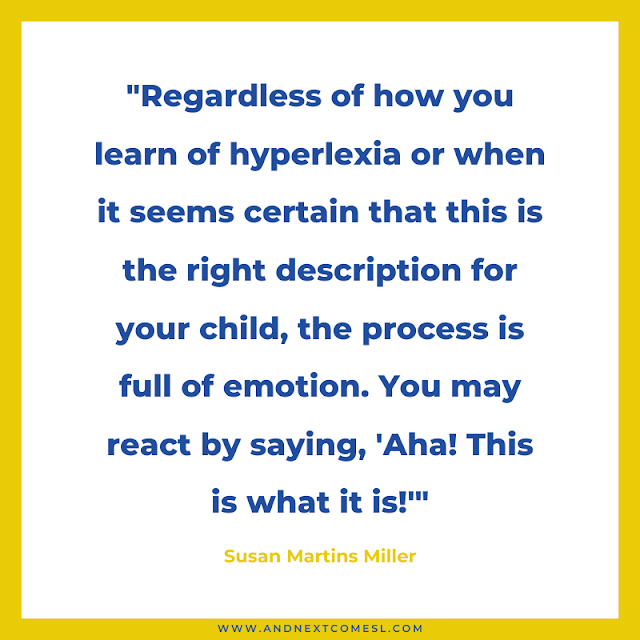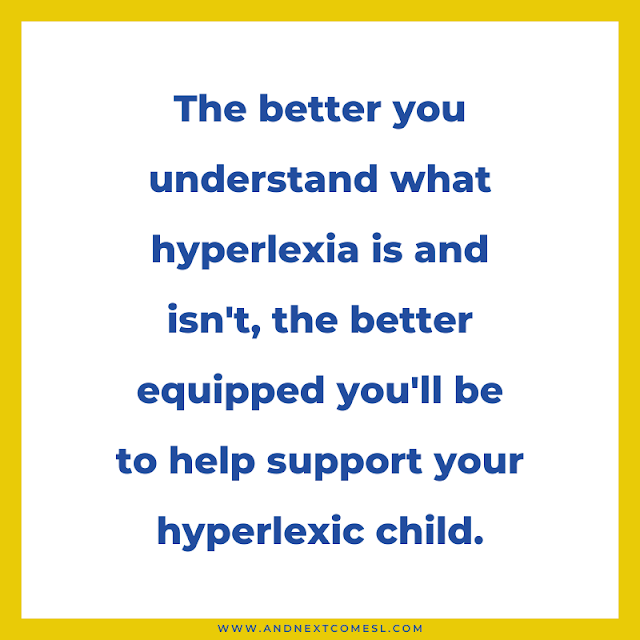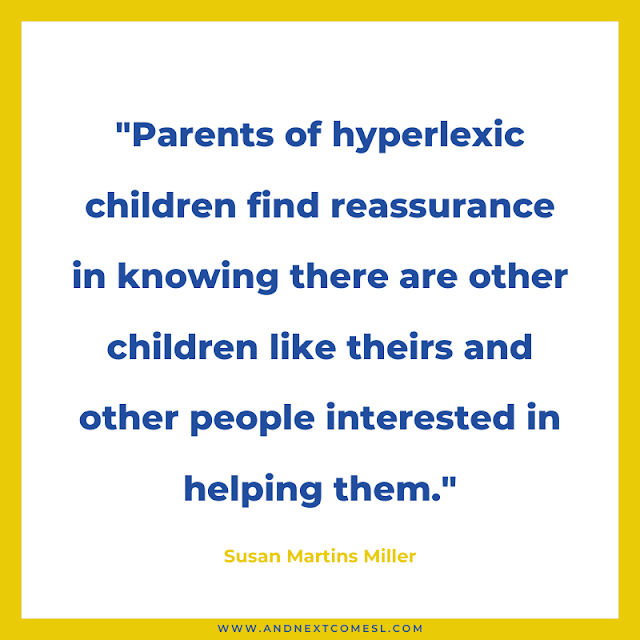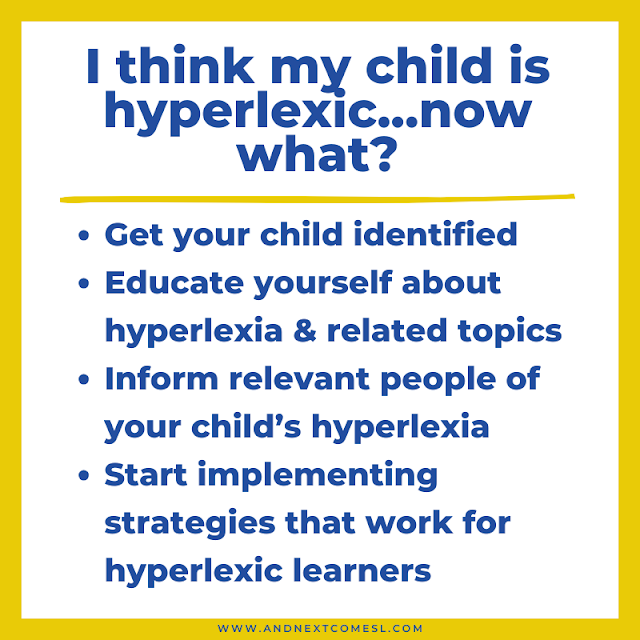When you first learn about hyperlexia, it can be absolutely mind-blowing and life changing.
You read the definition and it just fits.
Honestly, this quote sums things up so nicely: "Somewhere along this path, you encounter the term hyperlexia and a description that fits your child to a tee. For the first time, you hear a word that links the paradoxical characteristics of your child." (from Reading Too Soon by Susan Martins Miller)
Discovering the term hyperlexia is likely the aha moment you've been looking for because, finally, you can put a name to what you are witnessing with your own child and that's incredibly empowering and freeing. You likely feel excited and relieved. (I know I did).
Seriously, seeing the word hyperlexia for the first time was a huge aha moment for us. And I bet it was for you too.
And "regardless of how you learn of hyperlexia or when it seems certain that this is the right description for your child, the process is full of emotion. You may react by saying, 'Aha! This is what it is!'" (from Reading Too Soon by Susan Martins Miller) I know I felt emotional when I first googled hyperlexia after my son was identified and starting seeing photos of kids just like my son. I finally had the answer I had been searching for for years!
But now what? What do you do with that information? What's your next step as the parent of a potentially hyperlexic child? What should you do next if you suspect/know your child is hyperlexic?
Well, here are some of the next steps you can take when you learn that your child is hyperlexic.
So You Know it's Hyperlexia...Now What?
Please keep in mind that there's no right or wrong next step, and you can certainly do these in any order. However, there are some things you might want to consider now that you know what hyperlexia is, even if it's on a very basic level.
1. Get your child identified (aka get a "diagnosis")
First things first, it's important to understand that hyperlexia isn't a standalone diagnosis. Instead, it's a practical label. One that is often identified alongside another diagnosis or label (usually autism). You can learn more about the hyperlexia diagnostic process here.
You might also find it helpful to learn more about what's involved, in terms of tests or assessments, when it comes to identifying hyperlexia. You can read more about how to diagnose hyperlexia here.
Regardless of where you are in your journey, it is important to identify a child's hyperlexia as it's a key part of who they are and how they learn.
Since you suspect that your child is hyperlexic, it is strongly encouraged and recommended that you go for the following assessments as they will provide you with lots of additional information about your child:
- An autism assessment (there is a strong link between autism and hyperlexia)
- A speech and language assessment (ideally done by someone familiar with gestalt language processing)
- An occupational therapy assessment
If you've already had a formal autism, speech, and/or occupational therapy assessment and hyperlexia wasn't brought up in any of these, it might be worth following up and asking about hyperlexia. It's possible that they aren't familiar with the term or didn't think it was relevant to mention (yes, this does happen!).
2. Educate yourself about hyperlexia (and other related topics)
Parent education is so important. The better you understand what hyperlexia is and isn't, the better equipped you'll be to help support your hyperlexic child.
Here are some ways to educate yourself about hyperlexia:
- Download the free Hyperlexia Handbook for a quick crash course on hyperlexia
- Grab a copy of all of these great hyperlexia PDFs (they're great for sharing with teachers and professionals too!)
- Read through one of many articles about hyperlexia here
- Get familiar with the spiky profile of hyperlexic learners
- Learn about gestalt language processing and its connection to hyperlexia
- Join a hyperlexia support group and start connecting with other parents and hyperlexic adults - You can join the Hyperlexia Hub or connect with others during one of our live monthly parent support calls.
- Learn about other related topics such as sensory processing, autism, auditory processing, air writing, and comprehension (all of which you can find here on the blog!)
- Dig into the hyperlexia research (if you're really looking to get more indepth knowledge and insight) - Best not to dive into this right away if you literally just stumbled upon the term hyperlexia mere minutes ago though...
- Follow me on Instagram for quick digestible information, tips, and resources about hyperlexia (especially helpful if you find you're getting overwhelmed!)
- Book a 1:1 parent support session with me to get your specific questions about hyperlexia answered
It is worth noting that you might find it helpful to connect with others who are raising hyperlexic children. However, not all support groups are necessarily good (many are toxic and filled with misinformation about hyperlexia). So if you're looking for something different, we have the Hyperlexia Hub community and our live monthly support groups.
After all, "parents of hyperlexic children find reassurance in knowing there are other children like theirs and other people interested in helping them." (from Reading Too Soon by Susan Martins Miller)
3. Inform relevant people of your child's hyperlexia
It's important not only for you, as a parent, to understand hyperlexia, but for others who work with or support your child as well. Especially if your child is in school as they will likely require specific supports and accommodations that are tailored to their hyperlexic learning profile.
Who needs to know about your child's diagnosis will vary from family to family, but it may include your child's teacher, the school support staff, your child's therapists, other family members, and more. And don't forget to tell your child that they are hyperlexic!
When letting others know about your child's hyperlexia, be sure to share your child's strengths, as well as what areas they need support in. Tell others about what supports your child finds helpful (e.g., writing things down) and what their interests are.
Here are some useful resources to get you started:
- Introduce your child's teacher to hyperlexia with this one page free printable
- Print off a copy of the Hyperlexia Handbook to share with others
- Consider telling your child about their diagnosis since they, after all, are the hyperlexic child and deserve to have that knowledge. - These resources should help:
4. Start implementing strategies that play to the strengths of a hyperlexic learner
Just looking for practical tips on how to nurture your hyperlexic child and help them grow? I've got you covered there too! That's what this section - and this entire website! - is for.
Here are some resources that you might find helpful:
- First things first, don't discourage your hyperlexic child's letter play
- Turn on closed captioning (learn why here) and start writing
thingsevery thing down
- Read through this Strategies for Working with Hyperlexia pamphlet that is jam packed with ideas
- Grab a copy of the free guide called Hyperlexia: Therapy That Works - It's super helpful, but can be a little overwhelming at 61 pages long!
- Read more about some everyday accommodations and supports you can make at home
- Browse for resources for particular struggles, challenges, or goals (from potty training to fine motor to comprehension!)
- Get quick digestible tips and information about hyperlexia by following me on Instagram - Perfect for those of you who might be feeling a bit overwhelmed by all the information here
A Quick Recap of I Think My Child is Hyperlexic...Now What?
I know there is a lot of information and resources to go through here and that it can be extremely overwhelming. So, remember, you can take your time and go through each section slowly.
Or, here's a quick summary for those of you who need it...
If you think your child is hyperlexic, you should:
- Get your child identified, if you haven't already done so
- Educate yourself about hyperlexia and related topics (e.g., gestalt language processing, autism, sensory processing)
- Inform relevant people of your child's hyperlexia, especially if they are in school, so that your child can be well supported in a variety of environments
- Start implementing strategies that work for hyperlexic learners (e.g., write things down, turn on the closed captioning, encourage their letter play)
Hopefully, you found this information helpful.












